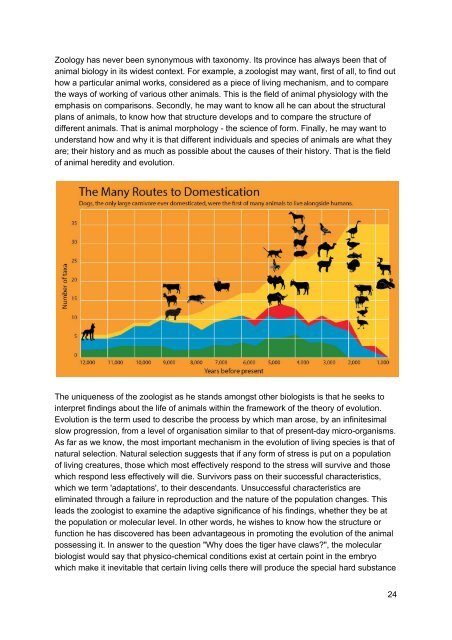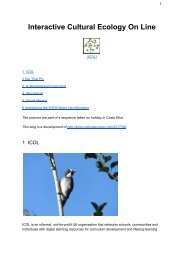scopeofzoology
Create successful ePaper yourself
Turn your PDF publications into a flip-book with our unique Google optimized e-Paper software.
Zoology has never been synonymous with taxonomy. Its province has always been that of<br />
animal biology in its widest context. For example, a zoologist may want, first of all, to find out<br />
how a particular animal works, considered as a piece of living mechanism, and to compare<br />
the ways of working of various other animals. This is the field of animal physiology with the<br />
emphasis on comparisons. Secondly, he may want to know all he can about the structural<br />
plans of animals, to know how that structure develops and to compare the structure of<br />
different animals. That is animal morphology - the science of form. Finally, he may want to<br />
understand how and why it is that different individuals and species of animals are what they<br />
are; their history and as much as possible about the causes of their history. That is the field<br />
of animal heredity and evolution.<br />
The uniqueness of the zoologist as he stands amongst other biologists is that he seeks to<br />
interpret findings about the life of animals within the framework of the theory of evolution.<br />
Evolution is the term used to describe the process by which man arose, by an infinitesimal<br />
slow progression, from a level of organisation similar to that of present-day micro-organisms.<br />
As far as we know, the most important mechanism in the evolution of living species is that of<br />
natural selection. Natural selection suggests that if any form of stress is put on a population<br />
of living creatures, those which most effectively respond to the stress will survive and those<br />
which respond less effectively will die. Survivors pass on their successful characteristics,<br />
which we term 'adaptations', to their descendants. Unsuccessful characteristics are<br />
eliminated through a failure in reproduction and the nature of the population changes. This<br />
leads the zoologist to examine the adaptive significance of his findings, whether they be at<br />
the population or molecular level. In other words, he wishes to know how the structure or<br />
function he has discovered has been advantageous in promoting the evolution of the animal<br />
possessing it. In answer to the question "Why does the tiger have claws?", the molecular<br />
biologist would say that physico-chemical conditions exist at certain point in the embryo<br />
which make it inevitable that certain living cells there will produce the special hard substance<br />
24




